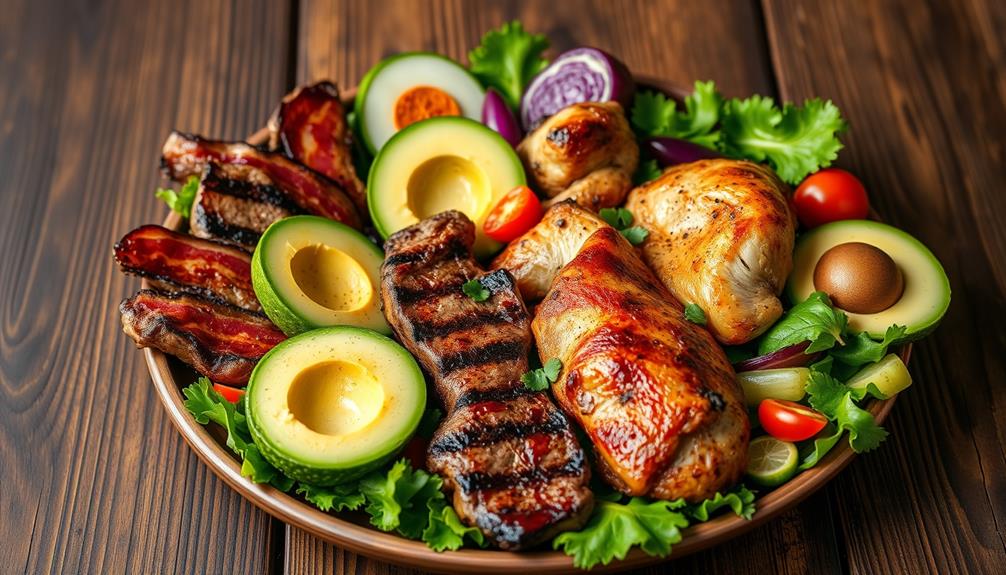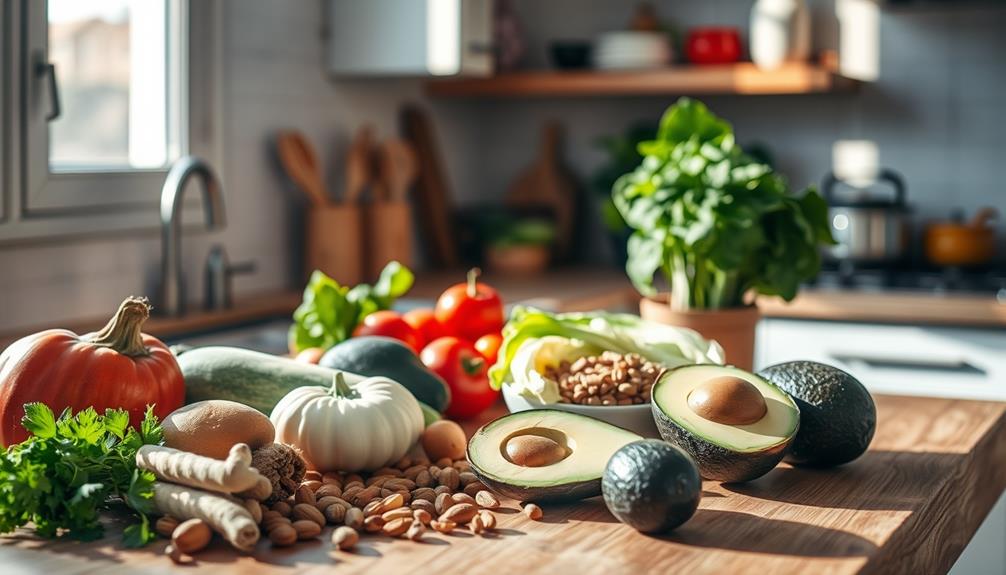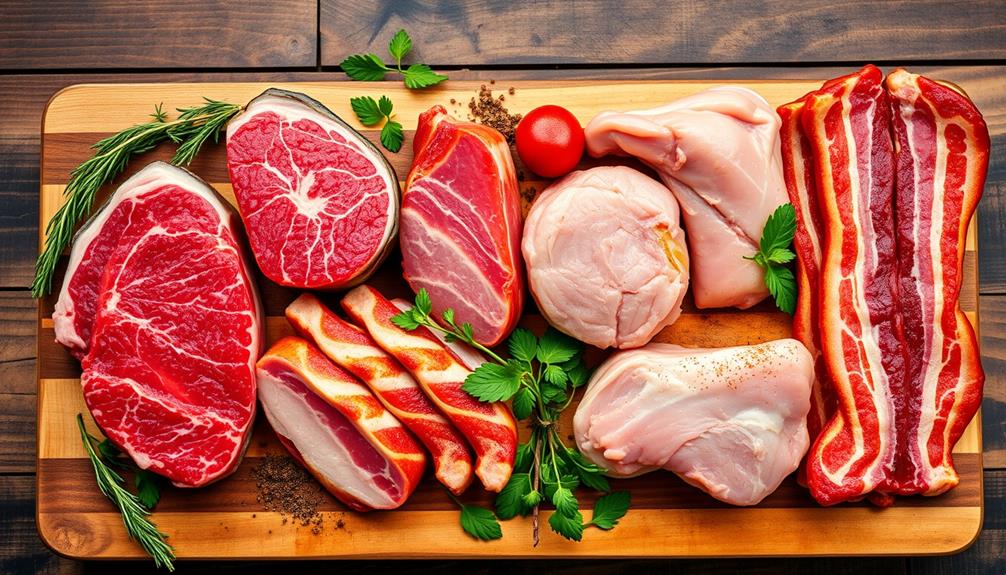Yes, you can definitely eat meat on a keto diet! Meat is an excellent source of high-quality protein and contains no carbohydrates, which is key for maintaining ketosis. You'll want to focus on fresh cuts like chicken, beef, pork, and fatty fish. These options not only support your protein needs but also help you reach your high-fat intake goals. Just remember to choose unprocessed meats and be mindful of portion sizes to avoid excessive protein. If you're curious about the best types of meat to include and some delicious preparation tips, there's plenty more to discover!
Key Takeaways
- Yes, meat is a staple on the keto diet, providing high-quality protein and zero carbohydrates essential for maintaining ketosis.
- Fresh meats like chicken, beef, pork, and turkey are excellent low-carb protein sources that fit perfectly within keto macronutrient goals.
- Fatty fish such as salmon and mackerel are encouraged for their omega-3 content and carb-free benefits, supporting overall health.
- Grass-fed and pasture-raised meats offer additional nutrients like omega-3s and CLA, enhancing the health benefits of your keto diet.
- Focus on unprocessed meats to avoid added sugars and harmful additives, ensuring a nutrient-dense and keto-friendly meal plan.
Overview of the Keto Diet
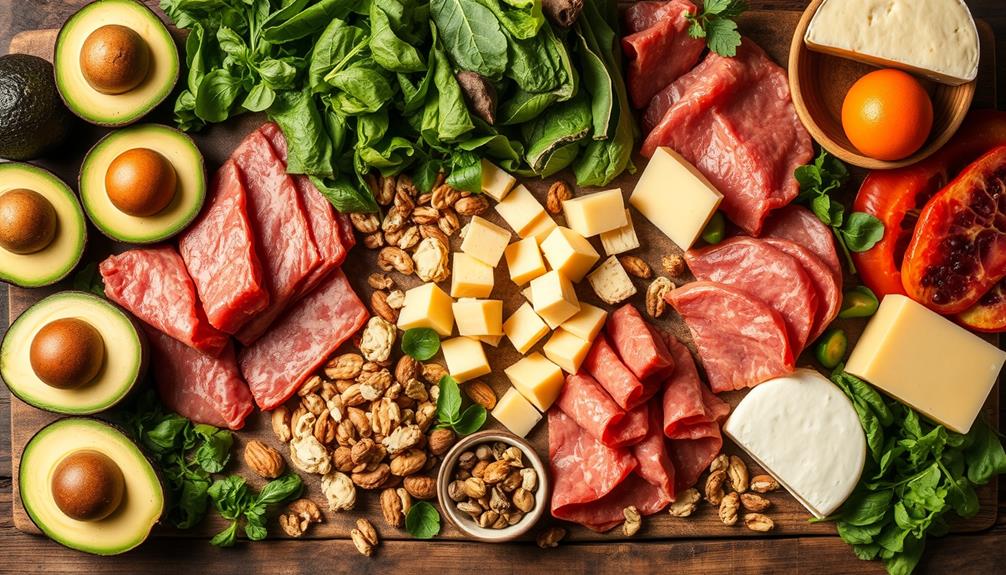
The keto diet is a unique nutritional approach that emphasizes a high-fat, low-carbohydrate intake to shift your body into a state of ketosis. This means you'll typically consume about 70-80% of your calories from healthy fats, 10-20% from protein, and only 5-10% from carbohydrates. By drastically reducing your carb intake, your body adapts to using fat as its primary energy source rather than relying on glucose from carbs.
Additionally, it's important to include nutrient-dense foods, such as those rich in antioxidants, to support overall health during the diet, especially when considering a diverse range of options like juice diets.
Originally developed to treat childhood epilepsy, the keto diet has gained popularity for its potential weight loss and metabolic health benefits. While you might notice initial weight loss, much of it can come from water loss as your glycogen stores deplete. This highlights the significance of understanding that not all weight loss may be fat loss.
Long-term adherence to the keto diet could lead to various health benefits, but it's essential to take an individualized approach. Consulting with healthcare professionals guarantees you tailor the diet to fit your unique needs.
Incorporating quality sources of protein and healthy fats, including meat, can help you maintain a balanced intake while enjoying the advantages of this high-fat, low-carb lifestyle.
Benefits of Eating Meat
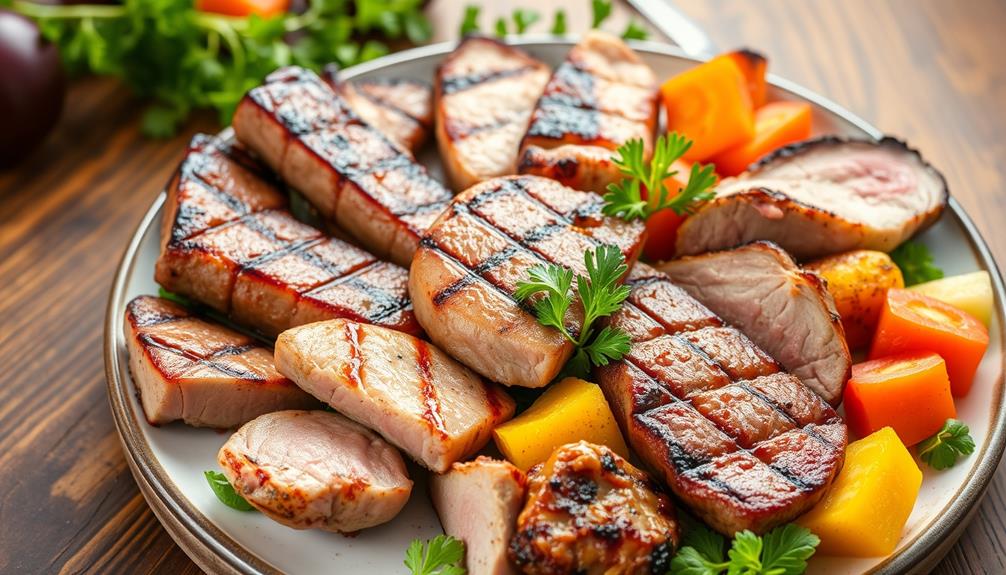
Eating meat offers a wealth of benefits, especially for those following a keto diet. It's an excellent source of high-quality protein, providing essential amino acids that help preserve and repair muscle, which is vital on a ketogenic diet.
Since fresh meats, like beef, pork, chicken, and turkey, contain zero carbohydrates, they're perfect for maintaining ketosis and promoting fat utilization for energy. Additionally, incorporating essential oils for overall wellness can complement your diet, enhancing your health journey.
Choosing fatty cuts of meat, such as ribeye or pork belly, aligns with the high-fat intake needed on the keto diet, helping you feel full and satisfied while reducing hunger.
Additionally, grass-fed and pasture-raised meats are richer in omega-3 fatty acids and conjugated linoleic acid (CLA), offering further health benefits, such as improved heart health and reduced inflammation.
Regularly consuming meat can also boost your HDL cholesterol levels, which is linked to a lower risk of heart disease.
This connection enhances the overall health benefits of a keto diet, making meat not just a staple for your meals but also a powerful ally in your journey toward better health and wellness.
Embracing meat in your diet can truly elevate your ketogenic experience.
Types of Meat to Include

When planning your keto meals, a variety of meat options can help you stay on track while enjoying delicious flavors. Incorporating different types of meat and poultry not only keeps your meals exciting but also provides essential nutrients.
For peak health and longevity, it's important to focus on balanced diet choices that include quality protein sources. Here are some great choices:
- Fresh chicken, beef, pork, and turkey: carb-free and high-quality protein sources.
- Fatty fish like salmon, mackerel, and sardines: rich in omega-3 fatty acids and nearly carb-free.
- Grass-fed beef: tends to be higher in omega-3s and CLA, making it a healthier option.
- Processed meats such as bacon and sausage: can be included in moderation, but check for added sugars.
- Shellfish like shrimp, crab, and lobster: excellent protein sources, low in carbs, and perfect for a variety of meals.
These options not only meet your keto requirements but also enhance your diet with flavors and textures.
Meat Preparation Tips

Often, preparing meat the right way can make a considerable difference in both flavor and texture, enhancing your keto meals. Start by choosing unprocessed meats, as they're naturally carb-free and packed with essential nutrients. Opt for grass-fed or pasture-raised options, especially for beef and chicken, to benefit from a better nutrient profile, including higher omega-3 fatty acids.
Additionally, understanding the differences between various cooking methods can help you make more informed choices for your keto meal prep, just like the way brewing methods affect caffeine content considerably.
Experiment with various cooking methods like grilling, roasting, or slow-cooking to reveal rich flavors and maintain moisture in your meats. These techniques help elevate the taste while keeping your meals satisfying and enjoyable.
Don't forget to incorporate herbs and spices to season your dishes without adding carbs. Garlic powder, paprika, and rosemary can enhance flavors considerably.
Meal prepping is another smart strategy. Marinate and grill chicken or ground beef in advance, so you always have keto-friendly options on hand. This not only saves time but guarantees you can stick to your low-carb foods without hassle.
Potential Risks and Considerations

The keto diet, while effective for many, comes with potential risks that you should be aware of. While meat is a staple, relying too heavily on it can lead to several concerns:
- Increased intake of processed meats may expose you to harmful additives, which may lead to digestive issues.
- High saturated fats can raise LDL cholesterol levels, risking cardiovascular issues.
- You might experience nutrient deficiencies due to a lack of fruits and high-fiber vegetables.
- Excessive protein consumption can trigger gluconeogenesis, potentially hindering your ability to maintain ketosis.
- A low-fiber diet can alter your gut microbiota, leading to digestive issues like constipation.
As you navigate the keto diet, balance is vital. Incorporating a variety of high-fiber vegetables can help mitigate nutrient deficiencies and improve digestion.
Monitoring your cholesterol levels is important to prevent cardiovascular complications. Additionally, consider the quality of the meat you consume, opting for unprocessed options when possible.
Conclusion on Meat Consumption
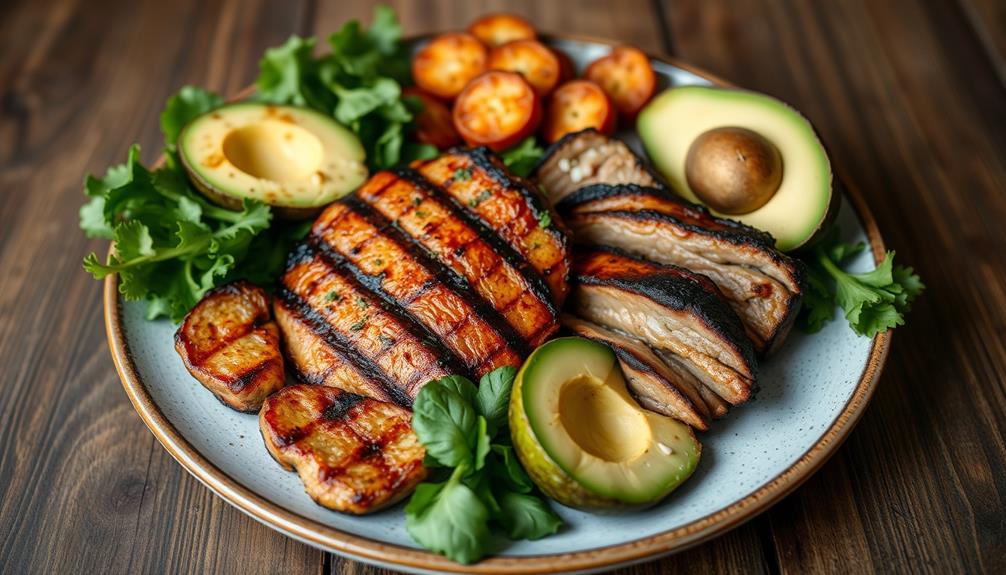
Meat plays an essential role in the keto diet, offering a high-quality protein source with zero carbs that helps maintain muscle mass and keeps you feeling full. Unprocessed meats like beef, pork, chicken, and fish are ideal choices, as they're free from carbohydrates and packed with essential nutrients.
Additionally, incorporating a variety of protein sources can aid in diversification strategy for a well-rounded diet, providing all the necessary amino acids. Opting for grass-fed and pasture-raised options can further enhance your nutrient intake, providing higher omega-3 fatty acids and better overall health benefits.
While meat is encouraged, it's vital to steer clear of processed meats, which often contain added sugars or fillers that can increase carbohydrate content and disrupt your ketosis.
A balanced diet on keto isn't just about meat; it also involves incorporating a variety of protein sources in moderation to prevent potential nutrient deficiencies.
Frequently Asked Questions
What Meat Is Not Keto-Friendly?
Not all meats are keto-friendly. Avoid processed meats with added sugars, battered options like chicken nuggets, and those glazed with sweet sauces. Also, skip meat products containing breadcrumbs or other carb-rich binders to maintain ketosis.
What Meats Can I Eat on Keto?
What meats can you enjoy on keto? You've got plenty of options! Think beef, pork, chicken, and fatty fish. Just remember to check for any hidden sugars in processed varieties. Stay mindful of your choices!
Can I Eat as Much Meat as I Want on Keto?
You can't eat as much meat as you want on keto. Moderation's key to avoiding nutrient imbalances. Focus on high-quality meats, balance with healthy fats, and listen to your body's hunger cues for ideal health.
Will I Stay in Ketosis if I Eat Meat?
If you feast on meat, you're likely to stay in ketosis, provided you choose fatty cuts and balance your meals. Just watch out for processed options; they can sneak in carbs and throw you off track.
Conclusion
In the grand tapestry of the keto diet, meat weaves a vibrant thread, rich in flavor and nutrients. You can savor succulent cuts and enjoy the benefits they bring, fueling your body like a well-oiled machine. However, remember to balance your plate with variety and mindfulness. Embrace the journey of flavor and health, letting each bite be a step toward your goals. Ultimately, the choice to include meat is yours—make it a delicious one.
